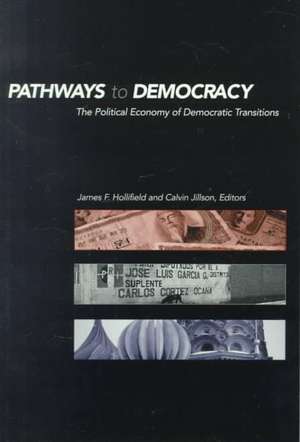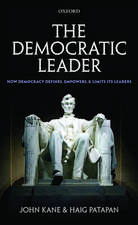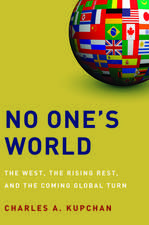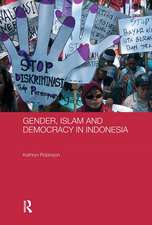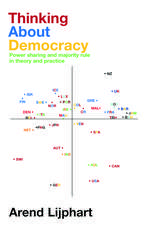Pathways to Democracy: The Political Economy of Democratic Transitions
Editat de James Frank Hollifield, Calvin C. Jillsonen Limba Engleză Paperback – 22 dec 1999
Preț: 206.13 lei
Nou
Puncte Express: 309
Preț estimativ în valută:
39.44€ • 42.18$ • 32.89£
39.44€ • 42.18$ • 32.89£
Carte tipărită la comandă
Livrare economică 17 aprilie-01 mai
Preluare comenzi: 021 569.72.76
Specificații
ISBN-13: 9780415924344
ISBN-10: 0415924340
Pagini: 344
Dimensiuni: 152 x 229 x 19 mm
Greutate: 0.64 kg
Ediția:New.
Editura: Taylor & Francis
Colecția Routledge
Locul publicării:Oxford, United Kingdom
ISBN-10: 0415924340
Pagini: 344
Dimensiuni: 152 x 229 x 19 mm
Greutate: 0.64 kg
Ediția:New.
Editura: Taylor & Francis
Colecția Routledge
Locul publicării:Oxford, United Kingdom
Recenzii
"Pathway to Democracy is a lively reader on different routes to democracy in the contemporary world, and a must-read for students looking to grasp the ambiguities, stresses, and uncertainties that accompany the process of building democratic societies and institutions." -- Ralph Thaxton, Professor of Politics, Brandeis University
"By dealing broadly with democratic transitions and consolidation in the contemporary world, these essays provide the reader with a good discussion of the way democratization is affected by culture, economic development, and international politics." -- Robert Kaufman, Professor, Department of Political Science, Rutgers University
"This is not only the latest and one of the most ambitious of the many collaborative volumes on "transitions to democracy," it is also the best. The editors and contributors set clear and high standards for the institutionalization of democratic regimes at century's turn. Most of the contributors succeed admirably in showing the intricate connections between domestic and international market factors, on the one hand, and qualities of liberty and political efficacy we associate with liberal democracy on the other. The book displays a refreshing intellectual honesty in its balance across successful, halting and unlikely transitions from authoritarian to democratic regimes." -- Martin O. Heisler, Professor, Department of Government and Politics, University of Maryland
"By dealing broadly with democratic transitions and consolidation in the contemporary world, these essays provide the reader with a good discussion of the way democratization is affected by culture, economic development, and international politics." -- Robert Kaufman, Professor, Department of Political Science, Rutgers University
"This is not only the latest and one of the most ambitious of the many collaborative volumes on "transitions to democracy," it is also the best. The editors and contributors set clear and high standards for the institutionalization of democratic regimes at century's turn. Most of the contributors succeed admirably in showing the intricate connections between domestic and international market factors, on the one hand, and qualities of liberty and political efficacy we associate with liberal democracy on the other. The book displays a refreshing intellectual honesty in its balance across successful, halting and unlikely transitions from authoritarian to democratic regimes." -- Martin O. Heisler, Professor, Department of Government and Politics, University of Maryland
Notă biografică
James Hollifield is Arnold Professor of International Political Economy and Director of international Studies at Southern Methodist University. Calvin Jillson is Chair of the Political Science department at Southern Methodist University, where he is also Director of the John Tower Center for Political Science.
Cuprins
PART I Introduction: The Democratic Transformations-Lessons and Prospects PART 11 The Political Economy of Democratic Transitions 1. Democracy and Its Enemies 2. On Markets and Democracy 3. Transitions to What? The Social Foundations of the Democratic Citizenship PART 111 The End of Authoritarianism in South and Central America 4. Transition Pathways: Institutional Legacies, the Military, and Democracy in South America 5. The Transformation of Labor-Based One-Partyism at the End of the Twentieth Century: The Case of Mexico 6. External Actors in the Transitions to Democracy in Latin America PART IV The Successes and Failures of the Developmental State in Asia 7. Democracy and Civil Society in Korea 8. From Confrontation to Conciliation: The Philippine Path toward Democratic Consolidation 9. Modernization, Democracy, and the Developmental State in Asia: A Virtuous Cycle or Un-ravelling Strands? 10. Democratic Inauguration and Transition in East Asia PART V The Challenge of Consolidation in Russia and Eastern Europe 11. Regime Transition and Democratic Consolidation: Federalism and Party Development in Russia 12. The Longest Transition 13. International lnfluences on Democratization in Post-communist Europe PART VI The Colonial Legacy and Sponsored Transitions in Africa 14. Understanding Ambiguity during Democratization in Africa 15. A Virtuous Circle? Democratization and Economic Reform in Africa PART VII Conclusion16. Democratization, International Relations, and U.S. Foreign Policy
